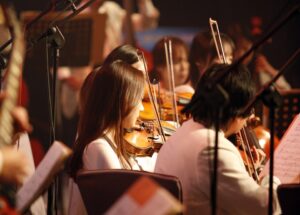Do you need to breathe some life into your compositions? Audiobro’s LA Scoring Strings (LASS) is quite the investment. This VST string library for Kontakt comes with a hefty $499 regular price tag, but the quality, stability and ease of use makes it well worth it. Check out our la scoring strings review below for more information.

Articulations
In Audiobro’s new engine you’ll find you can access all the articulations in a single interface. There’s a wide range including many of the standards you’d expect. These include legato, staccato, spiccato and pizzicato. There is also the addition of harmonics and marcato among others.
Where this library really excels is in the divisi. As you probably know, the string section is fundamentally broken into parts: Violin 1, Violin 2, Viola, Cello, and Double Bass. LASS allows you to further break those down into a Violin 1A, 1B, 1C and the same for each other sections. This gives you a heck of a lot of variety in tone, thus realism. You will also find auto-divisi where LASS 3 will automatically adjust to your playing and configure a realistic number of sections.
Also, there’s the FC (First Chair) patches for solo instruments. They’re OK in my opinion, but what good is a solo instrument without controllable vibrato? The lack of that feature is the reason I rarely use the FC patches. If you’re thinking about getting the FC packages separate, just have that in mind. The quality is great, but it lacks that feature.
Engine
Now onto the technical aspects.. In LASS, you’ll primarily be using CC1 (or mod wheel). Fortunately, you can reprogram it to suit the setup of your midi controller, if your keyboard lacks a modwheel. CC1, with long note patches (legato, sustain, etc.) is for dynamic crossfading between layers… in other words, basic dynamics. It’s not simply volume, it’s actually intensity. Oh yeah, and the velocity in which the note is attacked effects how the note is approached. A soft attack means a soft execution of the note, like a crescendo in a sense. A very soft attack results in portamento (good for eastern sounds). A hard attack will result in a direct execution of the note. Observation of the velocities can REALLY make a world of difference in the execution of a passage. When you use CC1 for short notes (staccato, spiccato), it controls the length/release of the notes.
Speaking of short notes, there’s something called A.R.T. If you simply hold the sustain pedal while pressing a note, the note plays repeatedly in 8ths, 16ths, etc., controllable via keyswitches. Not just that, but it employs round robin to avoid the machine-gun effect. It’s a very intuitive way to play… but wait, it gets better.
Auto Arranger
Are you tired of having to individually orchestrate each instrument and midi channel to finally hear how they all sound together? Well that’s no longer a problem. You can load an Auto Arranger multi in Kontakt which will let you control all those instruments instantly. Just start playing chords and based on the range of a given note, it’ll figure out what instrument to assign it to. It’s not perfect, but it’s fairly efficient at what it does. By default, there’s a max of 4 individual voices. You can up that by 3-fold if you manually set it up yourself… And yes, you can use this feature with legato as well! It sounds darn good.
New Features in LASS 3
LA Scoring Strings 3 was released in late 2021, and there are a great many updates and improvements. You’ll find Legato Sordino now included, as well as polyphonic legato and same note rebow. There’s also now integration for NKS and expression maps for various popular DAWs. (Make sure to check Audiobro’s website for a complete list). As previously mentioned, Audiobro LASS 3 now includes the Marcato articulation. In general, the patches have been remapped to improve workflow, for example by including all section divisis on a single patch. This eliminates the need to create multi patches.
Lastly, the new look ahead feature compensates for all articulations and can be a huge time saver. You can watch this video from Audiobro for an in depth explanation of this new feature: https://www.youtube.com/watch?v=zncLEpnG44A, particularly the part from 4:39.
Conclusion
The quality is excellent. The samples are very dry, which is perfect for those worried about wet samples. The total file size is 33GB uncompressed, which is quite modest for a big string library. Check out the library and demos here: https://audiobro.com/la-scoring-strings-3/. If you’re looking for the best LA Scoring Strings price, oftentimes you’ll find it on Black Friday, but there are also sometimes discounts throughout the year on Audiobro’s website. And if you own a previous version be sure to log in and check your personal price.
For a look at another library with divisi, check out our review here of 8Dio’s 8dio Agitato Grandiose Legato: https://musiclibraryreport.com/software-reviews/8dio-agitato-grandiose-legato-review/
Article updated March 9, 2023.
Article written by Mercer Lincoln.